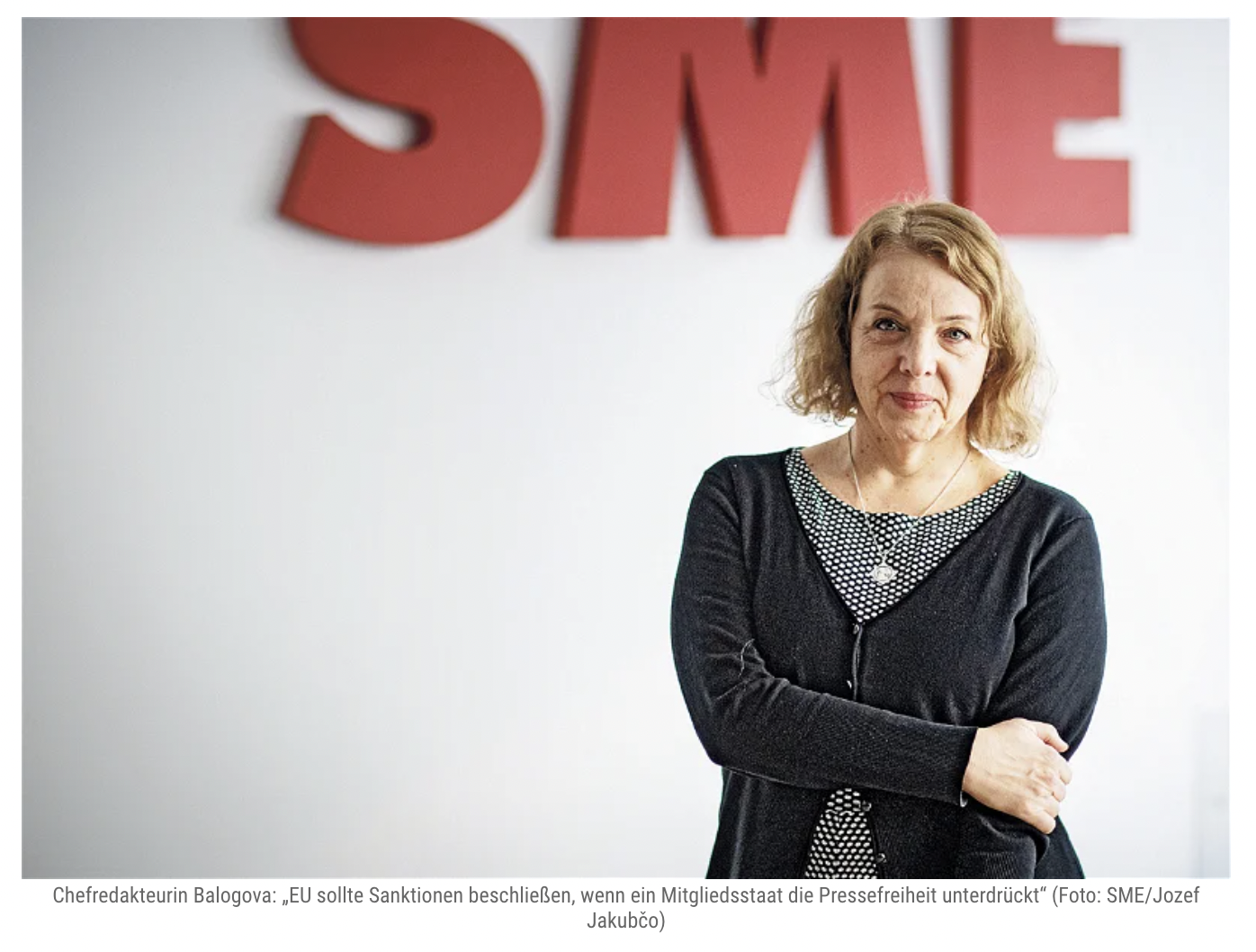"Fico doesn't talk to us anymore"
https://www.falter.at/zeitung/20231128/fico-spricht-nicht-mehr-mit-uns
As editor-in-chief of the Slovak daily SME, Beata Balogova is fighting against a dangerous opponent: her own prime minister.
Beata Balogova is editor-in-chief of the independent Slovak daily SME ("We Are"). She comes from the Hungarian minority in Slovakia. She studied journalism in Bratislava and completed a master's degree at Columbia University in New York. She won the 2019 European Press Prize in the Commentary category; until 2021, she was vice chair of the International Press Institute.
Beata Balogova comes to Vienna by bus from Bratislava. She has just finished tomorrow's newspaper, and now she is already sitting in Press Club Concordia. The topic: Freedom of press in Slovakia. Times are tough for journalists there again. Robert Fico, leader of the social-conservative, national-populist SMER, was appointed prime minister for the fourth time on 25th October. The politician was forced to resign in 2018 following mass protests after the murder of investigative journalist Jan Kuciak. Kuciak had been researching corruption in the government environment. Five years later, Fico is back.
Balogova is worried. But she is today better able to withstand pressure from the government: In 2021, Pluralis Fund, registered in the Netherlands, took over 34 percent of Petit Press - the publishing house that publishes SME. The idea behind this impact investment is to guarantee the independence of the editorial team and thus strengthen the free press. This does not sit well with the returning head of government. Last Monday, Robert Fico announced that he would no longer speak to SME and other critical media.
Falter: Ms. Balogova, what does the return of Robert Fico mean for your work?
Balogova: Robert Fico's return is already having an impact. He makes no secret of the fact that he wants to take revenge for the past years. We had been warning for years that his party was in the process of organizing itself as part of organized crime. During his last term in office, 40 members of his party were investigated for corruption and other crimes. When he was forced to resign, his successors unleashed the hands of the police. The investigations got serious. For Fico, his return was therefore existential. He wants to make sure that the police do not continue the investigation.
What is his attitude towards you?
Balogova: Fico is badmouthing us: he tells people that the critical media are foreign agents, that they are paid by foreign sources and that they are enemies of the nation. He's said that before. But now that he's prime minister again, it makes a difference for us. Fico doesn't talk to us anymore. Some in the government don't talk to us anymore either. This sends a signal to the readership: This newspaper is not relevant. At the same time, he legitimizes media outlets that spread conspiracy theories and pro-Kremlin narratives. For us, this means that we can debunk Russian propaganda. But when something is disseminated centrally by the government, it is of course even more difficult than before.
Jan Kuciak was shot dead in 2018 while researching corruption in Robert Fico's environment. Do you feel endangered yourself?
Balogova: Online harassment and insults have increased again. The police could look into it. But the police department is now being replaced, with a coalition partner of Robert Fico in charge. It may not be one of his priorities to protect critical journalists from online hate postings.
Does this sound like Viktor Orban's handbook?
Balogova: Fico tells his followers that civil society is the enemy. He now wants to take action against the NGOs. Previously, two percent of a taxpayers' money could be donated to NGOs. Now he's introducing giving it to either the NGOs or the parents. This is a cynical step, because now you must choose between NGOs or your own mother.
Times are tough for independent media. Advertising is disappearing, paywalls are part of the solution, voluntary micro-contributions from readers are another. What models do you pursue at SME?
Balogova: We're lucky. Two years ago, the investment fund Pluralis invested in our newspaper. This fund aims to support independent journalism and a free press. That is why we can also defend ourselves against pressure from government circles. I only hear from Pluralis every three months. They then ask me to send them the articles I was particularly proud of.
A survey on media freedom conducted by the Czech Median Institute, commissioned by the Bakala Foundation in Prague, and which I was able to present in Warsaw in April with Gazeta Wyborcza, clearly showed that the EU is perceived as a protecting power. Are you betting that the planned European Media Freedom Act (EMFA) will be able to protect media under pressure?
Balogova: I welcome the EU's initiative. The problem, however, is that in the end it is always up to the nation states and their governments how they deal with their media. At the EU level, as we see in Hungary, Orbán is allowed to get away with some things so that he can vote on other important initiatives in the EU bodies. If the EU now introduces an EU-wide Media Council, then that is good. But the members are determined by the governments.
Should the EU decide that there are sanctions against governments that harass their media?
Balogova: Yes. The EU should decide on sanctions if a member state suppresses the freedom of the press. Of course, that would be good. How else are you supposed to make progress?



